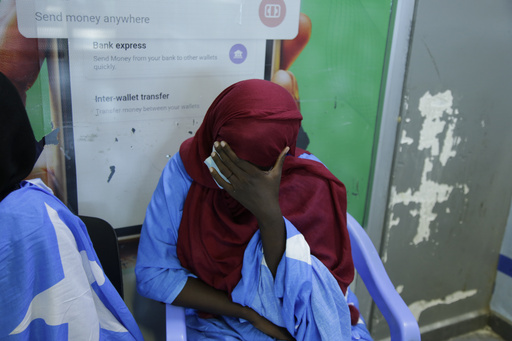
MOGADISHU, Somalia — Idil Abdullahi Goley embarked on her quest for a more promising future in Europe from Somalia, initially paying $6,500 to smugglers. Tragically, her expedition concluded with the loss of fellow migrants at sea, one of whom was heard reciting the Islamic declaration of faith as the situation spiraled out of control.
The unfortunate death of 25 migrants last month off the coast of Madagascar has shed light on an increasingly perilous pathway being taken by some Africans in their desperate attempts to reach Europe. Goley, who was among the 48 individuals rescued, recounted her harrowing journey—a path taken by many Somalis each year, driven by the rising threat of extremist violence and the devastating impact of climate-related crises back home.
As part of their migration strategies, some Somalis opt for routes through the Gulf states via the Red Sea and Yemen, while others, including Goley, venture on a longer maritime journey towards Mayotte, a French territory in the Indian Ocean known for its impoverished conditions, which is situated over 620 miles away.
According to estimates from French authorities, around 100,000 migrants currently reside in Mayotte. Many of these individuals have been impacted by the destruction caused by Cyclone Chido, which obliterated entire neighborhoods on December 14. In 2021, the International Organization for Migration reported that approximately two million people migrated from Somalia in search of better job prospects.
At 28 years old, Goley financed her trip through her small teashop business in Mogadishu, along with assistance from her brother and mother. Her intention was to reach Europe, settle her debts and return home to her three young children.
Her journey began with a flight from Mogadishu to Nairobi, Kenya, followed by a bus ride to Mombasa, where she and other migrants boarded fishing boats to head toward Mayotte. They harbored hopes of seeking asylum upon their arrival.
However, after spending three grueling days at sea, the group of around 70 individuals was transferred to smaller boats, which soon suffered engine failures. The smugglers, who had promised to repair the engines, abandoned them, leaving the migrants stranded without sufficient food or water. In order to survive, they resorted to catching fish and collecting rainwater.
As cyclone season approached, the seas became increasingly treacherous. Goley described an agonizing moment when she witnessed an infant die despite her attempts to help, leading to the heartbreaking necessity of disposing of the tiny body to avoid it decomposing on board.
Over the course of 13 days marked by hunger, deprivation, and intense heat, Goley experienced the loss of two friends. One died in her arms, while another’s final moments were filled with cries for help and recitations of the Shahada. Goley recalled these traumatic experiences as haunting memories she would carry with her forever.
Their ordeal concluded when a fishing vessel appeared, and the survivors signaled for assistance. After offering the fishermen $100 for their rescue, they were brought to a sports facility in Nosy Be, located in northern Madagascar. They eventually returned to Somalia via a chartered flight in early December.
Back in Mogadishu, Goley’s mother had been overcome with anxiety and had lost 20 kilograms (44 pounds) in fear for her daughter’s fate. “When I got home, my mother could hardly believe it until she heard my voice and saw me face to face,” Goley recounted.
Upon their return, Goley and the other survivors received words of encouragement from the Somali president’s special envoy for refugee affairs, who expressed hopes for a better future and promised government support. “They assured me they will never take the same risk again,” said Maryan Yasin.
Nonetheless, Goley revealed her intention to make another attempt at the same journey despite the nightmares that plague her memories. She is acutely aware that the struggles in Somalia remain unchanged and feels compelled to repay the smuggler’s fee.
“Even if it lands me in prison, I believe I would still find a better life than what I have here,” she stated, demonstrating her determination. Meanwhile, her mother grapples with fears that her daughter may not return if she ventures out again.
Other survivors are caught in a struggle between grief and hope for the future. Ahmed Hussein Mahadalle, aged 26, mourns the loss of his sister Hanan, 21, whose death has inflicted a profound pain he believes is unimaginable. Though relieved for his brother’s safe return, Haboon Hussein Mahadalle expressed sorrow for their sister and lamented the tragic loss. “Hanan was courageous and faced her fate with grace,” she said, tearfully honoring her sister’s memory.

